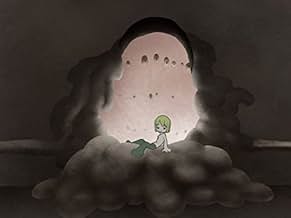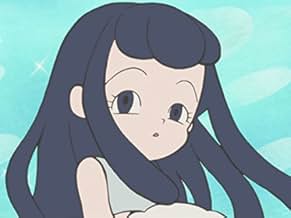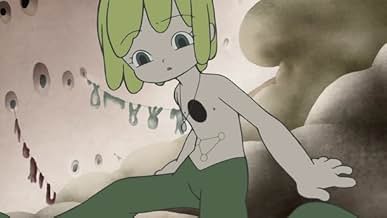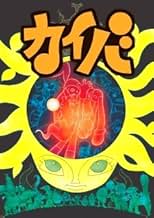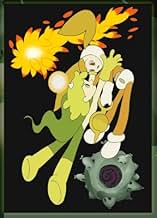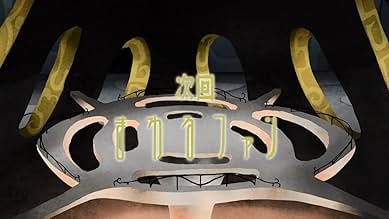VALUTAZIONE IMDb
8,0/10
2197
LA TUA VALUTAZIONE
In un mondo distopico futuristico dove i ricordi sono letteralmente conservati, comprati e venduti e ricchi hanno tutti i privilegi, un giovane amnesiaco sta cercando di scoprire chi è.In un mondo distopico futuristico dove i ricordi sono letteralmente conservati, comprati e venduti e ricchi hanno tutti i privilegi, un giovane amnesiaco sta cercando di scoprire chi è.In un mondo distopico futuristico dove i ricordi sono letteralmente conservati, comprati e venduti e ricchi hanno tutti i privilegi, un giovane amnesiaco sta cercando di scoprire chi è.
Sfoglia gli episodi
Taketora
• 2008
Daichi Endô
• 2008
Gô Shinomiya
• 2008
Shukuko Tsugawa
• 2008
Kumi Sakuma
• 2008
Kenjiro Tsuda
• 2008
Recensioni in evidenza
Note: this is from a video review, look for links on my profile page.
Kaiba is the visual type of sci-fi whose expositions are minimal, but relies on a more intuitive understanding of a possible world. It has this organic feeling, in that anything can grow anywhere, anyone can be any object. Perception is questioned, geometry limitless, but society is still very much familiar, as is often the case in this genre. Viewers' comprehension is baffled, but they try to juxtapose the puzzle any way. These, they learn, are artificial bodies, now a technology intrinsically.
Can memories be blown away like the sands of time? How does hue, variance, temperature change our impression of a moment? Can mood be separated from feeling? How is darkness filled in by the void of the mind? What difference does background have, does the exterior have a relational countenance? Can one be blind to the actual, yet give in to illusory possibilities? Why does memory function differently in stages? Are analogies ever adequate? Is this a sphere or a jumbled mess of degrees? Is fire ever possible without oxygen? Why does one even assume darkness has no atmosphere?
Is it to be assumed that flowers bloom on rocks? Would that be some sort of eel-snake amalgamation? Why at a micro level is there a practical reliance on the global scale? How could technology be anthropomorphized? Could the sociological descriptions of relations be that of mere substitutes? Is there 'intention' behind certain evolutionary traits to propagate? Survival depends on every possibility. But, from a personal, subjective perspective one values specific objects more or less, whether inanimated or still existent. Whichever plant this may be.
What if distinct planets do end up with different cultures? What kind of physicality is preferable, would it be solely based on functionality? How would its shape change consciousness? Would gene modification even be involved with artificial objects? It doesn't seem necessary to sustain a plush toy. There certainly is the likelihood of an industry springing up to sustain this, though. Would society be fundamentally different, or would the only distinction be in appearance, limitlessly? Vanity would likely still be derived from the same source. But how could ears spawn creatures? And what if a human facet passed down to blobs of cells, or even evolved molluscs? In this world even cerulean centaurs can be an option, actualizing mythology. Cats invent artificiality with the aid of emoji interfaces. The contrast between light and darkness. A window of technological potentialities. A cartoon future devoid of universal familiarity.
Is the cycle of life disrupted if indestructible mixtures are intertwined? Would it be possible for a flow of will to transition into a parallel continuation? Would it make a difference if it was fibre or protein? Are they the same electrical impulses that course through at different rates? Perhaps we could gauge the lapse of old age. Could the entirety of waking consciousness fit in some minuscule contraption? What would then be the difference between dolls - with eyes open - and ones where life inhabits? Could a blueprint exist for a perfect life?
What role would colour play in a smoothly-flowing society? Would rhythm make any sense if shapes are indistinguishable? How much hedonism could groups at large sustain and for how long? Historically, not indefinitely. In this narrative personalities diverge, and even clones forge their own destiny. Memories are uncertain as they're essentially recreations based on the amygdala. History is a series of interactions between brains and egos.
Technology, as shown in this anime, is often inspired by what nature ended up with in its random permutations. Water is as fluid as some machinery can be in navigating it. It plumbs the depths of some indistinct planet of indeterminate hue, just as it also delves into the subconscious role of memory and the psyche, abstractly.
How does one perceive incoherent likeness? How unique is a mental state upon the moment of judgement? Kaiba shows, viewers question, but answers aren't necessarily forthcoming. A fog of arbitrariness permeate Masaaki's anime, it seems, and it appears functionally useful in a sci-fi narrative, to create a sense of unexpectedness associated with the unknown. It attempts to create an overarching world, analogous to Evangelion, but the slice-of-life elements are mostly what elevates it to the interest of psychology, at a more quintessential level, than the interpersonal.
Kaiba can be a quirky, heightened experience with unusual art and a contemplative, inquisitive story that straddles the thresholds of dreams. The science fiction to Tatami Galaxy's romance.
Kaiba is the visual type of sci-fi whose expositions are minimal, but relies on a more intuitive understanding of a possible world. It has this organic feeling, in that anything can grow anywhere, anyone can be any object. Perception is questioned, geometry limitless, but society is still very much familiar, as is often the case in this genre. Viewers' comprehension is baffled, but they try to juxtapose the puzzle any way. These, they learn, are artificial bodies, now a technology intrinsically.
Can memories be blown away like the sands of time? How does hue, variance, temperature change our impression of a moment? Can mood be separated from feeling? How is darkness filled in by the void of the mind? What difference does background have, does the exterior have a relational countenance? Can one be blind to the actual, yet give in to illusory possibilities? Why does memory function differently in stages? Are analogies ever adequate? Is this a sphere or a jumbled mess of degrees? Is fire ever possible without oxygen? Why does one even assume darkness has no atmosphere?
Is it to be assumed that flowers bloom on rocks? Would that be some sort of eel-snake amalgamation? Why at a micro level is there a practical reliance on the global scale? How could technology be anthropomorphized? Could the sociological descriptions of relations be that of mere substitutes? Is there 'intention' behind certain evolutionary traits to propagate? Survival depends on every possibility. But, from a personal, subjective perspective one values specific objects more or less, whether inanimated or still existent. Whichever plant this may be.
What if distinct planets do end up with different cultures? What kind of physicality is preferable, would it be solely based on functionality? How would its shape change consciousness? Would gene modification even be involved with artificial objects? It doesn't seem necessary to sustain a plush toy. There certainly is the likelihood of an industry springing up to sustain this, though. Would society be fundamentally different, or would the only distinction be in appearance, limitlessly? Vanity would likely still be derived from the same source. But how could ears spawn creatures? And what if a human facet passed down to blobs of cells, or even evolved molluscs? In this world even cerulean centaurs can be an option, actualizing mythology. Cats invent artificiality with the aid of emoji interfaces. The contrast between light and darkness. A window of technological potentialities. A cartoon future devoid of universal familiarity.
Is the cycle of life disrupted if indestructible mixtures are intertwined? Would it be possible for a flow of will to transition into a parallel continuation? Would it make a difference if it was fibre or protein? Are they the same electrical impulses that course through at different rates? Perhaps we could gauge the lapse of old age. Could the entirety of waking consciousness fit in some minuscule contraption? What would then be the difference between dolls - with eyes open - and ones where life inhabits? Could a blueprint exist for a perfect life?
What role would colour play in a smoothly-flowing society? Would rhythm make any sense if shapes are indistinguishable? How much hedonism could groups at large sustain and for how long? Historically, not indefinitely. In this narrative personalities diverge, and even clones forge their own destiny. Memories are uncertain as they're essentially recreations based on the amygdala. History is a series of interactions between brains and egos.
Technology, as shown in this anime, is often inspired by what nature ended up with in its random permutations. Water is as fluid as some machinery can be in navigating it. It plumbs the depths of some indistinct planet of indeterminate hue, just as it also delves into the subconscious role of memory and the psyche, abstractly.
How does one perceive incoherent likeness? How unique is a mental state upon the moment of judgement? Kaiba shows, viewers question, but answers aren't necessarily forthcoming. A fog of arbitrariness permeate Masaaki's anime, it seems, and it appears functionally useful in a sci-fi narrative, to create a sense of unexpectedness associated with the unknown. It attempts to create an overarching world, analogous to Evangelion, but the slice-of-life elements are mostly what elevates it to the interest of psychology, at a more quintessential level, than the interpersonal.
Kaiba can be a quirky, heightened experience with unusual art and a contemplative, inquisitive story that straddles the thresholds of dreams. The science fiction to Tatami Galaxy's romance.
10pfer82
Kaiba is a piece of art. This work by Masaaki Yuasa is a gem, the kind of which only few examples can be found in every art... We already owe to Studio Madhouse some of the finest animation works like Satoshi Kon's "Paranoia Agent" and "Paprika", Hiroshi Hamasaki's "Texhnolyze" and "Shigurui", Rintaro's "Metropolis" and many more. But with Masaaki Yuasa, Madhouse has discovered a true genius of this time and age.
Kaiba is a poetic and philosophical tale packed with so much emotion and brilliantly imaginative conceptual and visual ideas, it is absolutely breathtaking. The graphical style reminds of Osamu Tezuka, the father of Japanese manga, but just as in the latter's work "Phoenix", the innocent, child-like drawings serve a deep and dense reflection about mankind and human condition.
Revolving around the parallel concepts of time and loss, life and death, memories and oblivion, Kaiba succeeds in creating a whole coherent universe, characterized by its overwhelming melancholy. It is truly comforting to see that such ambitious and groundbreaking projects can still see the light of day today, regardless of their chances at commercial success. Thank you Masao Maruyama, co-founder of Madhouse studio and producer of the series, for having made Kaiba happen!
It will be so hard for Kaiba to find its public, a million miles away from commercial animated series that most of time have little to offer to the heart and mind... While art lovers have long learned to distinguish between meaningless blockbusters and personal independent cinema, Japanese animation hasn't yet achieved to be widely considered in its diversity, even in Japan.
Kaiba is pure art and emotion, a brilliant masterpiece and a unique experience that will leave an everlasting imprint in its viewers' heart.
Kaiba is a poetic and philosophical tale packed with so much emotion and brilliantly imaginative conceptual and visual ideas, it is absolutely breathtaking. The graphical style reminds of Osamu Tezuka, the father of Japanese manga, but just as in the latter's work "Phoenix", the innocent, child-like drawings serve a deep and dense reflection about mankind and human condition.
Revolving around the parallel concepts of time and loss, life and death, memories and oblivion, Kaiba succeeds in creating a whole coherent universe, characterized by its overwhelming melancholy. It is truly comforting to see that such ambitious and groundbreaking projects can still see the light of day today, regardless of their chances at commercial success. Thank you Masao Maruyama, co-founder of Madhouse studio and producer of the series, for having made Kaiba happen!
It will be so hard for Kaiba to find its public, a million miles away from commercial animated series that most of time have little to offer to the heart and mind... While art lovers have long learned to distinguish between meaningless blockbusters and personal independent cinema, Japanese animation hasn't yet achieved to be widely considered in its diversity, even in Japan.
Kaiba is pure art and emotion, a brilliant masterpiece and a unique experience that will leave an everlasting imprint in its viewers' heart.
It's hard to write a review of Kaiba. So much of its charm and beauty lies in the animation, the rough drawings and fluid movements of the characters. Madhouse and Masaaki Yuasa have gathered together some of the best animation talent around, and it shows -- the art is consistently strange and beautiful, and stands out in a tradition that's known for a very specific, very standardized art style.
But that's just the surface. Underneath all that Kaiba is provocative, intelligent science fiction that questions the relationships between mind, bodies, and memories. Along the way it touches on love, family, the state and rebellion, providing nuanced portrayals of each. And it has a mythic arc that actually holds up to greater scrutiny.
Tragic and uplifting in equal measure, Kaiba is not just one of the best anime series ever made but one of the best TV shows. It aired in obscurity and has yet to be licensed in the States, but looks for all the world like a big-budget production. It's rare in any medium or industry to see such a personal, idiosyncratic expression made at such great expense, and the show that emerged was every bit as miraculous as the events of its creation.
But that's just the surface. Underneath all that Kaiba is provocative, intelligent science fiction that questions the relationships between mind, bodies, and memories. Along the way it touches on love, family, the state and rebellion, providing nuanced portrayals of each. And it has a mythic arc that actually holds up to greater scrutiny.
Tragic and uplifting in equal measure, Kaiba is not just one of the best anime series ever made but one of the best TV shows. It aired in obscurity and has yet to be licensed in the States, but looks for all the world like a big-budget production. It's rare in any medium or industry to see such a personal, idiosyncratic expression made at such great expense, and the show that emerged was every bit as miraculous as the events of its creation.
Kaiba is an unusually animated anime. In fact it doesn't look like an anime at all. It looks more like a 1970s European cartoon with it's rounded shapes and distorted characters.
The story takes place in a world and galaxy where a person's memory is encapsulated in a small cone shaped device that can be placed into the head of another body. Also, using a special ray gun a person can open and step into another person's memories. The story features a boy with no memory and a hole in his chest who finds himself being attacked by strange creatures for no apparent reason. With help from a few others, he has to figure out how to survive and who he is. It's one of those series that is hard to explain. You just have to watch it.
The story takes place in a world and galaxy where a person's memory is encapsulated in a small cone shaped device that can be placed into the head of another body. Also, using a special ray gun a person can open and step into another person's memories. The story features a boy with no memory and a hole in his chest who finds himself being attacked by strange creatures for no apparent reason. With help from a few others, he has to figure out how to survive and who he is. It's one of those series that is hard to explain. You just have to watch it.
Created and directed by Masaaki Yuasa (Crayon Shin-Chan), Kaiba has been long on my list and I'm so glad I finally got to it, it was very fun. Following Warp in a futuristic dystopia where minds can be implanted into chips then moved from body to body (a la Altered Carbon), Kaiba's animation feels new and refreshing among the rest of its genre, and its surreal, abstract narratives fit perfectly in its art direction. For something gorgeous to watch with a good bit of philosophical thought behind it I would highly recommend this series, although would warn even with its friendly demeanour it is not a series for young kids, it does contain adult themes. Again, I loved the series, but the plot and meaning gets quite heady towards the end and the narrative of it all tends to fall apart. Something that's obviously deliberately abstract and opaque in its conclusions, I'm still struggling to exactly follow the overarching narrative and world building, but I'm sure there's a million "Kaiba Explained" videos out there. Similar to Evangelion, scoring this feels like grading the by far most talented kid in the class who unfortunately just didn't quite understand the assignment. Still would recommend, especially for fans of anime that haven't seen.
Lo sapevi?
- QuizThe series received an Excellence Prize for animation at the 2008 Japan Media Arts Festival.
I più visti
Accedi per valutare e creare un elenco di titoli salvati per ottenere consigli personalizzati
- How many seasons does Kaiba have?Powered by Alexa
Dettagli
- Tempo di esecuzione
- 24min
- Colore
Contribuisci a questa pagina
Suggerisci una modifica o aggiungi i contenuti mancanti

